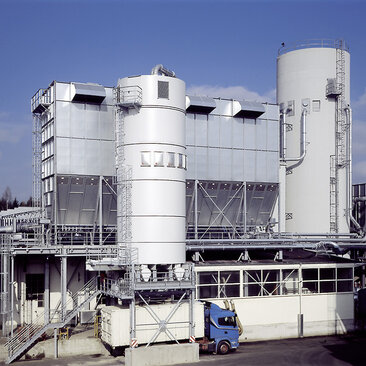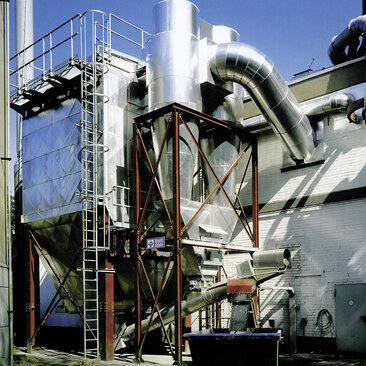Contact
You have any questions?
Or want us to call you?
By using our online form your questions and requests will be forwarded to the responsible contact person.
...to the form
Intelligent air moving in wood waste recycling
Recycling wood waste as fuel makes good sense for both ecological and economical reasons. Since, in the foreseeable future dumping in landfill sites will no longer be permitted (Technical Directive for Municipal Solid Waste, Provisions for Waste Storage) and material recycling is also only possible within certain limits, there will be considerable amounts of wood waste which need dealing with.
Wood waste can be used in power stations, cement works, waste incineration plants or in specially designed solid waste boiler plants. Wood waste is a "Bio-mass" and a regenerative fuel. Using it to generate energy means the avoidance of carbon dioxide emissions (CO²) which would otherwise occur during the incineration of fossil fuels.
Mechanical processing (shredding and grading) of the recyclable material is necessary so as to be able to use wood waste efficiently in large incineration plants as an energy source. The shredded material is transported to storage silos from where the wood chips are mechanically or pneumatically fed into the corresponding incinerator in metered volumes.
Particularly during shredding, but also when the shredded material is being transported, high standards are demanded of the air-handling and separating technology which are essential to the dust collection system.
Pressure-shock-resistant filters, developed by the plant builder Venti Oelde, have proved successful. There is a preliminary separating chamber arranged upstream of the filter to protect it against aggressive substances. A reduction of the flow velocity to below 5 m/s ensures a steady and optimum deposit of dust onto the filter bags.
Tested pressure-shock-resistant and flameproof rotary airlocks must be installed to provide fire and explosion isolation. The safety technology includes a spark extinguishing plant, since it is possible that sparks, produced during shredding by impurities contained in the wood are entrained.
Particular consideration must be given to the capture and handling of dust in mechanical processing and conveying plants. Venti Oelde paid particular attention to the design and locating of collecting elements and the choice of suitable filters.
Intelligent air handling technology is required not only in treating and conveying the wood waste. Primary air and induced draft fans and efficient flue gas dust removal, complying with the German Federal Pollution Control Regulations depending on plant size and type of combustion material, are essential to ensure that this type of solids is cleanly burnt.


